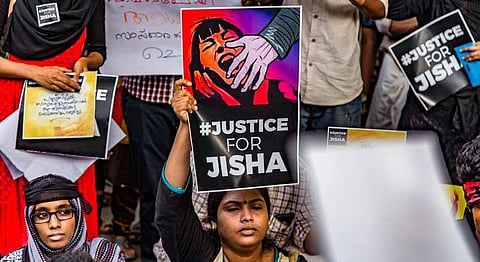
- HOMEGROWN WORLD
- #HGCREATORS
- #HGEXPLORE
- #HGVOICES
- #HGSHOP
- CAREERS
- ABOUT US
- CONTACT US

Last Thursday, a 30-year-old Dalit law student was brutally raped and killed in her house in Kerala’s Ernakulam District. Since the assault and murder, various women and Dalit rights organisations have taken to the streets in protest, demanding justice. Social media support came with the hashtag #JusticeForJisha, and various media outlets drew comparisons to the Nirbhaya gang-rape. Days after this incident, a 19-year-old nursing student was allegedly gang-raped in an auto-rickshaw in Varkala, Thiruvananthapuram.
Kerala, which boasts a favourable gender ratio, has been applauded for positive social indicators of education and literacy in the past. However, a look at crime rate numbers paints a very different picture in terms of women’s safety. The Enigma of the Kerala Woman, a book edited by Swapna Mukhopadhyay, explores the failed promise of literacy and its correlation with the status of and crimes against women--and that failed promise is a ground reality.
As per the Kerala Police’s official website, registered rape cases have more than doubled in the last eight years, from 568 in 2008 to 1263 in 2015. While these numbers are an indicator of increased rape crimes, they still aren’t an accurate depiction. Advocate Sandhya Raju from the Human Rights Law Network in Kochi tells us over the phone, “When a women from a marginalised community, lower caste or lower economic background tries to file a complaint, the police rarely registers the case or conducts an investigation.”
Speaking specifically in the case of Jisha, Raju tells us that her case was registered by her mother who visited the police station regularly and ensured it was registered, or else police inactivity could have washed over her case as well. “Just because men and women are educated does not change the facts on the ground that this is still a patriarchal society,” Raju says, affirming that cases of sexual and domestic violence have gone up in the last five years, and are higher with respect to Dalit women.
The educated, socially progressive impression that Kerala holds as a state, with matrilineal beliefs in several areas, does not translate to fewer cases of crime against women. As per a National Crime Records Bureau (NCRB) report, the rate of crimes against women in Kerala is 63 per lakh population, which is higher than the national average of 56.3. In 2015 alone, a total of 12,383 crimes against women were reported, which include molestation, kid-napping, eve-teasing, dowry deaths, cruelty by husbands or in-laws as well as rape. The highest numbers were recorded in Malappuram (1,474) and Trivandrum Rural (1,180). While positive social indicators such as highest literacy in the country (94 percent), lowest maternal mortality rate (167) and highest women’s literacy (92 percent) are an important step forward within the state, they paint an incomplete picture.
Words: Rhea Almeida
